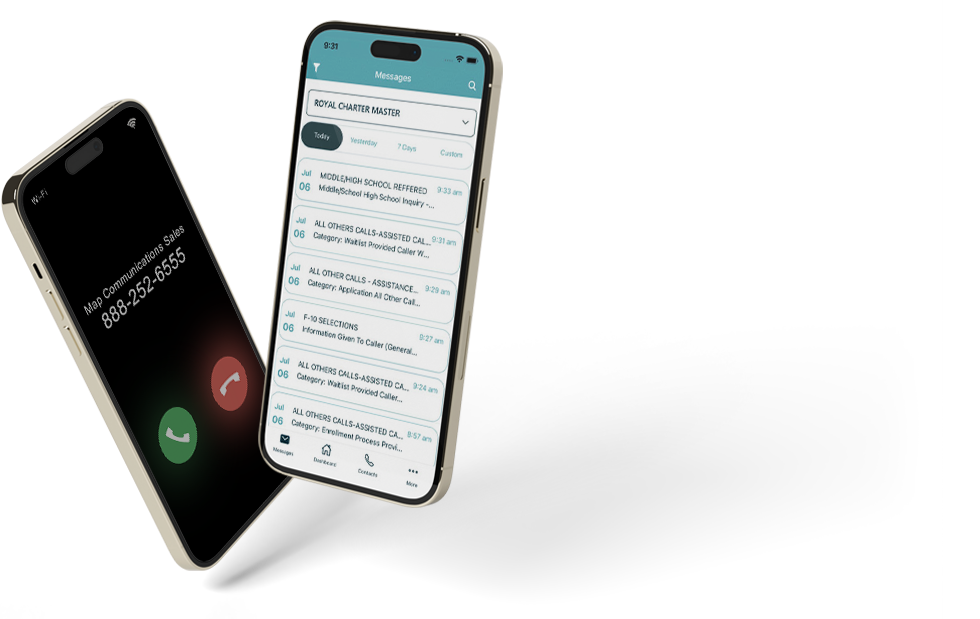In business, how you handle a phone call can say just as much as your website or storefront. Whether it’s a new customer looking for help or a longtime client with an urgent request, that first interaction matters. After all, missed calls can mean missed opportunities.
That’s why so many companies turn to call centers and virtual receptionists. These answering services help businesses stay responsive, even when the team is busy, out of the office, or clocked out for the night. From taking messages and scheduling appointments to handling emergencies or high-volume days, they keep things running smoothly behind the scenes.
The truth is, the list of industries that use call centers keeps growing. It’s not just large corporations or call-heavy businesses anymore. Today, healthcare providers, law offices, e-commerce brands, real estate professionals, and even HVAC technicians rely on call centers to stay organized and build trust with customers.
Key Industries That Use Call Centers
Businesses across call center sectors rely on professional phone support to stay responsive. Let’s take a closer look at the industries that benefit most from these services.
Healthcare
Medical practices, clinics, hospitals, and emergency services all depend on reliable communication, and that’s exactly what call centers provide. A professional answering service provides after-hours support, appointment scheduling, and more, ensuring patients can always reach a live person when it matters most.
Privacy and compliance are critical in healthcare, which is why many call centers serving this industry are trained in HIPAA and other regulations.
Legal Services
Attorneys and legal firms are often tied up in court, meetings, or depositions. Missing a call could mean losing a potential client—or worse, appearing unresponsive in a high-stakes situation. For example, criminal attorneys often receive calls at late hours, so it is important that you are available 24/7 to get them the answers they need. Call centers provide a lifeline for legal professionals by answering every call promptly and professionally.
Call center agents can act as an extension of your legal team, helping build trust with clients from the very first interaction. Solo lawyers and firms alike benefit from the consistency and customer service that call centers provide.
Real Estate and Property Management
Whether you’re a real estate agent managing showings or a property manager coordinating maintenance, your phone is your lifeline. But being available at all times isn’t always practical. That’s where the call center industry can help.
Virtual receptionists can handle incoming inquiries, schedule viewings, take maintenance requests, and relay urgent information to your team in real time. This is especially helpful for landlords and property managers juggling multiple tenants and buildings.
E-commerce and Retail
Of all the industries that use call centers, retail stands out for its constant demand and high customer expectations. Round-the-clock customer service is expected. Call centers give e-commerce businesses the ability to provide support across time zones, handle returns, answer frequently asked questions, and manage order inquiries. They also make it possible to ramp up service without hiring and training a large internal team.
Trades and Field Services
Electricians, plumbers, HVAC technicians, and other field service pros are often on the move. Taking a call while on a ladder or in a crawl space isn’t always possible or safe. Companies that have call centers make sure that job bookings, emergency calls, and new client inquiries are captured and responded to quickly. Bilingual agents help ease communication barriers, opening up new opportunities with a wider range of customers.
Finance and Insurance
In industries where trust and discretion are essential, such as banking, insurance, and financial advising, call centers play a key role in handling sensitive information with care. Clients often call with urgent, personal matters that require tact and professionalism. Companies with call centers in the finance space ensure that every call is handled with consistency and security.
Technology and SaaS
Startups and fast-growing tech companies use call centers to scale their customer support quickly. Virtual receptionists can help with Tier-1 troubleshooting, lead qualification, or user onboarding, ultimately making companies appear larger and more established.
Call center clients also benefit from help desks, product launches, and high-volume campaigns, giving the internal team room to focus on product development and growth.
Hospitality and Travel
In the hospitality world, the customer experience starts long before check-in. Hotels, resorts, and travel agencies use call centers to handle booking questions, guest inquiries, and overflow during busy seasons. This ensures callers always get a timely, friendly response, even outside of regular office hours.
A virtual receptionist can also assist with event planning services, concierge requests, and guest relations, helping to deliver the high-touch service the industry is known for.
Why All Business Sizes Use Call Centers
If you’ve ever wondered who uses answering services, the answer is companies of all sizes and industries. While you might expect them to be reserved for big corporations, they’re often most transformative for small and mid-sized businesses. For a fraction of the cost of hiring in-house staff, small businesses can access professional, friendly phone support that makes them look and feel like a larger operation.
For larger organizations, call centers bring scalability and flexibility. They can adapt quickly to seasonal fluctuations, marketing campaigns, or growth spurts without overburdening internal teams.
No matter your size, the impact is clear: missed calls lead to missed opportunities. And in today’s competitive environment, that’s a risk few businesses can afford.
Does Your Business Require Call Center Services?
The industries that use call centers are as diverse as the services they offer. Businesses across the board rely on call center support to stay responsive, organized, and connected.
Think about your own business needs for a moment. Are important calls going to voicemail? Do potential leads fall off because no one was available to answer their questions? Are your employees stretched too thin to give every caller the attention they deserve? If so, it may be time to consider a virtual receptionist or call center service.
Customer expectations are only rising, and outsourcing tasks to a team of trained professionals can boost both efficiency and trust.
Start your free trial and see how Map Communications can help you stay ahead in a competitive market.


